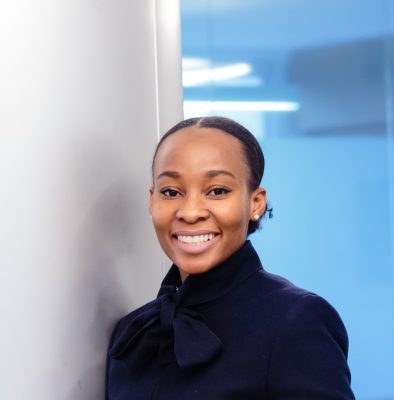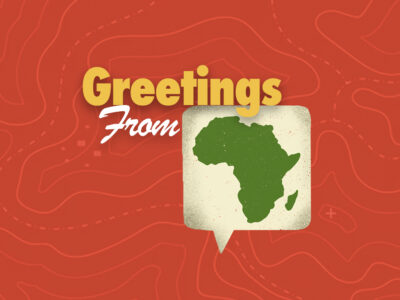
Sary nomen'i Mama A. Nii Owo.
Mandritra ny taona 2019 ary ao anatin'ny fanentanana media sosialy hankalazana ny fimaroam-piteny antserasera, hifandimby ny Afrikana mpikatroka ara-piteny sy ireo mpanandra-teny amin'ny fitantanana ny kaonty Twitter @DigiAfricanLang hizara ny zava-niainan'izy ireo amin'ny famelomana indray sy amin'ny fampiroboroboana ny fiteny afrikana. Hiresaka momba an'i Mama A. Nii Owo (@AdobeaO) sy izay kasainy horesahana mandritra ity herinandro ity ny lahatsoratra.
Rising Voices: Lazao anay ny mombamomba anao azafady indrindra.
My name is Mama A. Nii Owoo. I also write under a pseudonym Naa Oyoo Owoo which is my ethnic and ancestral name. My ethnic language is Gã. Gã is the indigenous language of natives from Accra, Ghana. In addition to GãDangme, I speak a number of languages: Akan (Ghanaian language, English, Spanish and French.
I am curious about the kind of implementational spaces that educators can open or closed for indigenous languages to thrive. I love teaching and have worked with students of all age levels in Ghana, Cuba, the USA, Spain and Canada. I have also worked as a Translator in Spain at the Universidad de Sevilla International Center in Spain. Currently, I am studying for a Ph.D. in Language & Literacies Education at the Ontario Institute for Studies in Education.
My research interests lie in language policy and how educators’ language experiences inform the way they implement mother-tongue based bilingual education policy for students.
Mama A. Nii Owoo no anarako. Manoratra amin'ny solon'anarana Naa Oyoo Owoo izay anarana ara-poko sy ara-drazako ihany koa aho. Gã no fitenim-poko misy ahy. Fitenin-teratany avy ao Accra, Ghana ny Gã. Ankoatra ny GãDangme, miteny amin'ny fiteny maromaro ihany koa aho: Akan (fiteny Ghaneana), anglisy, espaniola ary frantsay.
Liana aho amin'ny karazana sehatra (mandrotsaka-mametraka) azon'ny mpanabe sokafana na akatona mba hampahomby ny fiteny tompontany. Tia mampianatra aho ary efa niasa niaraka tamin'ny mpianatra avy amin'ny sokajin-taona rehetra tao Ghana, Kiobà, Etazonia, Espaina ary Canada. Efa niasa ho mpandikanteny koa aho tany Espaina tao amin'ny Foibe Iraisampirenena Universidad de Sevilla ao Espaina. Amin'izao fotoana izao aho mianatra mba hahazoana Ph.D amin'ny Fanabeazana Fiteny sy ara-literatiora ao amin'ny Ivontoerana Ontario misahana ny Fanadihadiana ao amin'ny Fanabeazana.
Mifototra amin'ny politikam-piteny sy ireo iainan'ny mpampianatra fiteny mampafantatra ny fomba ametrahana-androtsahana ny tenin-drazana miankina amin'ny politikam-panabeazana am-piteny roa ho an'ny mpianatra ny fikarohako
RV: Manao ahoana izao ny fiteninareo eo amin'ny fiainana andavanandro sy amin'ny aterineto?
Gã, my native language is going through a process of revitalization and modernization. Apart from local television and radio programs in Ghana, older and younger generations of Gã speakers in Ghana and in the diaspora are creating awareness around the preservation of the language by setting up virtual language havens on social media platforms such as Facebook, Twitter, Blog sites, websites, etc.
Looking at popular culture, artists are creating resources such as music and theatrical skits and shorts in Gã that can be useful in the educational sphere. You can also find resources such as religious literature, bibles, dictionaries and historical treatises of the how the Gadangme came to settle in present-day Ghana after a series of migrations which has been linked to the biblical exodus from Egypt.
Mizotra mankany amin'ny lalan'ny fahavelomana indray sy ny hahamaoderina azy ny Gã, tenindrazako. Ankoatra ireo fandaharana amin'ny fahitalavitra sy ny onjampeo ao Ghana, dia eo ampanorenana fanairana amin'ny fikajiana ny fiteny amin'ny alalan'ny akanin'ny fiteny virtoaly ao amin'ny sehatra media sosialy tahaka ny Facebook, Twitter, tranonkalam-bilaogy, tranonkala sns ireo taranaka tanora sy lehibe mpiteny Gã.
Raha mijery ny kolontsaim-bahoaka, eo ampananganana fitaovana toy ny zipo sy kilaotin-kira (takon-kenatra sa sivilizasiona?) sy tantara tsangana amin'ny fiteny Gã izay azo ampiasaina amin'ny tontolom-panabeazana ny artista. Azonao atao ihany koa ny mahita fitaovana toy ny literatioram-pivavahana, baiboly, rakibolana sy haren-tantara amin'ny nahatongavan'ny Gadangme ho tonga amin'izao anio izao, taorian'ny andiam-pifindramonina maromaro izay mifandraika amin'ny fifindramonina lehibe (eksodosy) ara-bibilika avy any Ejipta.
RV: Ka lohahevitra tahaka ny ahoana moa no ifantohanao mandritra ny herinandro itantananao ny kaonty Twitter @DigiAfricanLang?
I will focus on the accessibility and availability of educational resources for learning indigenous Ghanaian languages online. I will focus more on Gã as it is my native language.
Hifantoka amin'ny fomba fahazoana sy ny fisian'ny fitaovana ara-panabeazana hianarana fiteny ghaneana tompontany antserasera aho. Hifantoka bebe kokoa amin'ny Gã izay tenindrazako aho.
RV: Inona avy ireo tena mandrisika anao havitrika ara-nomerika amin'ny fiteninareo?
I used to be a Spanish teacher and I loved my job. However, I became involved in indigenous language revitalization because I realized that the absence of educational resources in indigenous languages is a huge contributor to Ghana’s child literacy crisis. Having proficiency in your mother tongue is critical to your educational development and to understanding other languages and cultures.
Additionally, I was studying a language my community did not need. There is a need for Africans to tailor their education to meaningfully address the developmental issues their communities face. Mother-tongue based instruction is a cornerstone of literacy development and vital to developing academic skills in English. Unfortunately, this task has been neglected in schooling Africans.
I founded the Afroliteracies Foundation (AF), @afroliteracies, a think tank and action-research based network for revitalizing indigenous African languages in education based in Ghana. The Afroliteracies Foundation brings together teachers and community language experts to develop culturally relevant bilingual teaching and lesson materials for free use in Ghana and other contexts.
Nizatra ho mpampianatra teny espaniola aho ary tiako ny asako. Saingy nifantoka bebe kokoa amin'ny famelomana indray ny fiteny tompontany aho satria tsapako fa miteraka krizy lehibe amin'ny fahaizan'ny ankizy ao Ghana mamaky teny sy manoratra ny fahabangan'ny fitaovam-pianarana amin'ny fiteny tompontany. Iankinan'ny ain-dehibe tokoa ny fahaizana tsara ny tenin-drazanao amin'ny fivelarana ara-panabeazana sy hahatakarana ny fiteny sy ny kolontsaina hafa.
Ankoatra izany, nianatra fiteny tsy nilain'ny vondrom-piarahamonina misy ahy aho. Misy ny filàna ho an'ny Afrikana hamolavola ny fanabeazana mba hamahana ny olana atrehin'ny vondrom-piarahamonina amin'ny resaka fivoarana. Ny fanabeazana amin'ny fitenin-drazana no vatofototry ny fivelarana fahaizan-taratasy ary iainkinan'ny aina amin'ny fampivoarana fahaizana akademika amin'ny teny anglisy. Indrisy anefa fa natao tsinontsinona izany asa izany eo amin'ny fampianarana afrikana.
Natsangako ny Afroliteracies Foundation (AF), @afroliteracies, vondrom-pandinika sy mikaroka-miasa amin'ny famelomana imaso indray ny fiteny tompontany afrikana eto Ghana. Avondron'ny Orina Mpanasoa Afroliteracies ny mpampianatra sy ny manampahaizana manokana amin'ny fitenim-bondrom-piarhaamonina hampivelatra fitaovana ilaina amin'ny lesona sy fampianarana am-piteny roa manan-danja ara-kolontsaina mba ho ampiasaina maimaimpoana ao Ghana sy amin'ny toe-javatra hafa.
RV: Inona ny fanantenanao sy ny nofinofinao amin'ny fiteninareo?
In one of my wildest dreams, Gã is a language at par with English in terms of the intellectual vibrancy and socio-economic status English enjoys. But that is a limited vision because I tend to see English as an imperial language fighting against the linguistic diversity that is woven into the fabric of human cultures. So, I hope that intellectualizing Gã to the zenith that meets our community’s immediate and long-term needs can set off a trend for other lesser known indigenous African languages in the areas of educational and technological innovation, scientific research, literary and artistic reproduction, etc.
Iray amin'ny nofiko tsy voafehy indrindra ny mahita ny Gã ho fiteny tsy mena-mitaha amin'ny teny anglisy eo amin'ny sehatra ara-pahaizana sy eo amin'ny sata ara-tsosialy sy toekarena izay isitrahan'ny (teny) anglisy. Saingy endriny amin'ny voafetra ihany io satria mirona kokoa aho mijery ny (teny) anglisy ho miady amin'ny fimaroana ara-piteny izay narandrana amin'ny kolontsain'olombelona noforonina. Ka manantena aho fa ny fampakarana ny Gã ho eo an-tampon'ny tenim-pahalalàna izay mamaly tsara eo noho eo sy lovainjafy ny filàn'ny fiarahamonina no ahafahana mametraka fironana hampahalalàna bebe kokoa ireo fiteny tompontany afrikana (tavela) eo amin'ny tontolom-pivoarana ara-panabeazana sy ara-teknolojia, fikarohana siantifika, famokarana literatiora sy artistika, sns.





